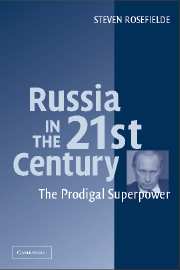Book contents
- Frontmatter
- Contents
- List of Figures and Tables
- List of Acronyms
- Preface
- Acknowledgments
- RUSSIA IN THE 21ST CENTURY
- Introduction
- 1 After “The End of History”
- 2 Prodigal Superpower
- 3 Structural Militarization
- 4 What Could Have Been Done?
- 5 Muscovite Metamorphosis
- 6 Military-Industrial Reform
- 7 National Vulnerabilities
- 8 The Miasma of Global Engagement
- 9 Putin's Choice
- 10 Candor
- Conclusion
- Glossary
- Notes
- Selected Bibliography
- Index
3 - Structural Militarization
Published online by Cambridge University Press: 18 December 2009
- Frontmatter
- Contents
- List of Figures and Tables
- List of Acronyms
- Preface
- Acknowledgments
- RUSSIA IN THE 21ST CENTURY
- Introduction
- 1 After “The End of History”
- 2 Prodigal Superpower
- 3 Structural Militarization
- 4 What Could Have Been Done?
- 5 Muscovite Metamorphosis
- 6 Military-Industrial Reform
- 7 National Vulnerabilities
- 8 The Miasma of Global Engagement
- 9 Putin's Choice
- 10 Candor
- Conclusion
- Glossary
- Notes
- Selected Bibliography
- Index
Summary
The most important aspect of the CIA's mismeasurements was the false readings they gave of Soviet economic potential. The numbers made it seem that the USSR could gradually normalize to a mass consumption society or do so more swiftly by curtailing military outlays. Gorbachev's revelation that living standards were stagnant implied a very different problematic. The USSR was losing in the great living standards race with the West because administrative command planning wasn't up to the task. And what Gertrude Schroeder has called the post-Stalin treadmill of economic reform did little to improve the USSR's economic capability.
The system, however, was good for something. As World War II and subsequent Defense Intelligence Agency (DIA) studies clearly demonstrated, the Soviet economic mechanism was capable of mass-producing competitive combat weapons. Central planning allowed the leadership to concentrate its best research and development, material, and human resources on the task without worrying that market forces would bid them away, a prioritization that paid conspicuous dividends in terms of military and international political power. This ability to focus resources on the development and production of weapons, together with the importance placed on military power by Stalin and his successors, led to the Soviet Union's “structural militarization.” In other words, supply-side comparative advantage priority access to resources and the demands of the Soviet general staff (genshtab), the military-industrial complex (voennyi promyshlennyi kompleks [VPK]), and the Kremlin coalesced to drive the Soviet economy.
- Type
- Chapter
- Information
- Russia in the 21st CenturyThe Prodigal Superpower, pp. 33 - 57Publisher: Cambridge University PressPrint publication year: 2004



